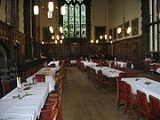
Bray v Ford
Encyclopedia
Bray v Ford [1896] AC 44 is an English defamation law
case, which also concerns some principles of conflict of interest relevant for trusts
and company law.
This was libelous by the jury at trial. But Cave J had directed the jury that the College’s articles did in fact allow for pay of services as a solicitor. The jury awarded £600 damages, and the question was whether the award could stand in the face of the misdirection.
The Court of Appeal (Lord Esher MR, Lopes LJ and Rigby LJ) held this was a misdirection, but that it was libel anyway, the misdirection was unsubstantial and the jury would have decided the same.
English defamation law
Modern libel and slander laws, as implemented in many Commonwealth nations as well as in the United States and in the Republic of Ireland, are originally descended from English defamation law...
case, which also concerns some principles of conflict of interest relevant for trusts
English trusts law
English trusts law is the original and foundational law of trusts in the world, and a unique contribution of English law to the legal system. Trusts are part of the law of property, and arise where one person gives assets English trusts law is the original and foundational law of trusts in the...
and company law.
Facts
Mr Bray was a governor of Yorkshire College. Mr Ford was the vice-chairman of the governors and had also been working as a solicitor for the college. Bray sent him a letter, and circulated it to others, saying,
“Sir, during last summer, as you are aware, it came to my knowledge that whilst holding the fiduciary position of vice-chairman of the Yorkshire College you were illegally and improperly, as you know, making profit as its paid solicitor.”
This was libelous by the jury at trial. But Cave J had directed the jury that the College’s articles did in fact allow for pay of services as a solicitor. The jury awarded £600 damages, and the question was whether the award could stand in the face of the misdirection.
The Court of Appeal (Lord Esher MR, Lopes LJ and Rigby LJ) held this was a misdirection, but that it was libel anyway, the misdirection was unsubstantial and the jury would have decided the same.
Judgment
The House of Lords, composed of Lord Halsbury LC, Lord Watson, Lord Herschell, Lord Shand unanimously reversed the Court of Appeal’s decision, on the basis that the decision of whether a libel existed was peculiarly within the jury’s power to decide, and the misdirection did constitute a ‘substantial wrong or miscarriage’ requiring a new trial. Lord Herschell's opinion went as follows.See also
- Cook v DeeksCook v DeeksCook v Deeks [1916] 1 AC 554 is a UK company law case, concerning the illegitimate diversion of a corporate opportunity.In UK company law the case would now be seen as falling within the Companies Act 2006 section 175, with a failure to have ratification of breach by independent shareholders under...
[1916] 1 AC 554 - Regal (Hastings) Ltd v Gulliver [1942] 1 All ER 378
- Industrial Development Consultants Ltd v Cooley [1972] 1 WLR 443
- Island Export Finance Ltd v Umunna [1986] BCLC 460
- Framlington Group plc v Anderson [1995] BCC 611
- Gencor ACP Ltd v DalbyGencor ACP Ltd v DalbyGencor ACP Ltd v Dalby [2000] 2 BCLC 734 is a UK company law case concerning piercing the corporate veil.-Facts:Mr Dalby was a director of the ACP group of companies, including Gencor ACP Ltd. He dishonestly diverted assets and opportunities to his British Virgin Islands company. Gencor ACP Ltd...
[2000] 2 BCLC 734 - CMS Dolphin Ltd v SimonetCMS Dolphin Ltd v SimonetCMS Dolphin Ltd v Simonet [2001] is a UK company law case concerning directors' duties.-Facts:Mr Simonet resigned from his position as managing director of CMS and he set up a new company. CMS’s staff followed and so did the major clients. CMS sued Mr Simonet for the profits he made, alleging...
[2001] 2 BCLC 704

